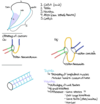C12 - The hindgut of carnivores and ruminants, blood supply and innervation Flashcards
1
Q
Define hindgut
A
- The caudal portion the the embryonic gut which develops into the colon and the rectum
- Begins at the cecum
- Ends at the anus
2
Q
Give the portions of the hindgut
A
- Cecum (Right side of the abdominal cavity, except from in pig)
- Colon
- Rectum (Partly inside, partly outside the abdomen)
3
Q
Caecum
Dog and ruminants
A
- Basis caeci (Dorsal dilation of cecum, eq)
- Corpus caeci
- Apex caeci
- Curvatura caeci major
- Curvatura caeci minor
-
Teniae caeci (eq, su) (Bands of cecum)
- Tenia dorsalis (Ø su)
- Tenia ventralis
- Tenia medialis
- Tenia lateralis
- Haustra caeci (eq, su) (Sacculations of the cecum between the teniae and between the plica semilunares)
- Ostium caecocolicum (Opening between cecum → colon)
- Valva caecocolica (eq)
- M. sphincter caeci (ca, bo, su)
- Plica iliocolica (Attaches to tenia dorsalis)
- Plica caecocolica (C**olon ventrale dextrum → tenia lateralis of the caecum)
-
Dog:
- No haustra, no tenia
- Right side, L2-L4
- Caudal directed
- Attached to ileum and colon ascendens by peritoneal folds
- Communicate with colon ascendens at the ostium ileocaecolicaum
-
Ruminants:
- Right dorsal part of the abdominal cavit
- Rounded blind tip is directed caudally

4
Q
Caecum
Give the interspecies differences
A
-
Tenia caeci (eq, sus)
- Tenia dorsalis (ø sus)
- Tenia ventralis
- Tenia medialis
- Tenia lateralis
- Haustra caeci (eq, sus)
- Valva caecolica (eq)
- M. sphincter caeci (ø eq)
- Ca: ø haustra & tenia
- Ru: ø haustra & tenia
- Eq: 4 haustra & tenia
- Su: 3 huastra & tenia
5
Q
Colon
Dog
A
-
Colon ascendens
- Shortest of the three segments
- Lateral: duodenum descendens and right lobe of pancreas
- Medial: root of the mesentery
- Flexura coli dextra
-
Colon transversum
- Right → left, passes between stomach and a. mesenterica cranialis
- Th12 level
- Flexura coli sinistra
-
Colon descendens
- Extends to the pelvic inlet, continued by the rectum
- Longest of the three segments
- Lies dorsally in the left half of the abdominal cavity
- Related medially to duodenum ascendens: plica duodenocolica
- Location: dosal in the abdomen

6
Q
Colon
Ruminant
A
-
Colon ascendens
- Ansa proximalis coli (Continued by ansa spiralis)
-
Ansa spiralis coli (Coiled on the left side of the mesentery)
- Gyri centripetales (Coils in which the ingesta move toward the flexura centralis)
- Flexura centralis (The last in-going coil is continuous with the first out-going coil
- Gyri centrifugales (Coils in which the ingesta move away from the flexura centralis towards the ansa distalis)
- Ansa distalis coli
- Colon transversum (Passes from right to left cranial to the cranial mesentery artery, joining the right and left colic flexures)
- Colon descendens
- Colon sigmoideum (bo) (S-shaped curve just cranial to the rectum)

7
Q
Rectum
Dog and ruminants
A
- Ampulla recti (enlargement of terminal part)
- Follows colon into the pelvic cavity, terminates at canalis analis
- Pelvic part of large intestines
- Most is covered with peritoneum
-
Dog:
- Short
- L7 level
- enters the pelvic cavity ventral to sacrum
- In the retroperitoneal part of the pelvic cavity: ampulla recti
- Outer muscle layer of rectum: m. retrococcygeus
-
Ruminants:
- Peritoneal is here
- Retroperitoneal is short
- Thin muscular layer
-
M. retrococcygeus:
- Origin: long rectal musculature
- Insertion: ventral surface of 1st coccygeal
8
Q
Bloodsuply of the large intestines
Dog
A
- Caecum: a. ileocolica → a. caecalis
- Colon ascendens:
- a. ileocolica → r. colicus
- a. mesenterica cranialis → a. colica dextra
- Colon transversus: a. mesenterica cranialis → a. colica media
- Colon descendens:
- a. mesenterica caudalis → a. colica sinistra
- a. colica media
- Rectum: a. mesenterica caudalis → a. rectalis cranialis

9
Q
Blood supply of the large intestines
Ruminants
A
- Cecum:
- A. mesenterica cranialis → a. ileocolica → a. caecalis
- Colon ascendens
- Gyri centripetalis: a. ileocolica → r. colici
- Gyri centrifugalis: a. ileocolica → a. colica dextrae
- Colon transversus:
- A. mesenterica cranialis → a. colica media
- Colon descendens:
- A. mesenterica caudalis → a. colica sinistra
- Colon sigmoideum:
- A. mesenterica caudalis → aa. sigmoideae
- Rectum:
- A. mesenterica caudalis → a. rectalis cranialis
10
Q
Innervation
A
- Sympathetic:
- Decreased activity
- Ggl. & plexus mesentericus cranialis
- Ggl. & plexus mesentericus caudalis
- Parasympathetic:
- Increased activity
- Vagal nerves: supply intestines to the junction between colon transversus and colon descendens
- Pelvic nerves: supply colon descendens and rectum


